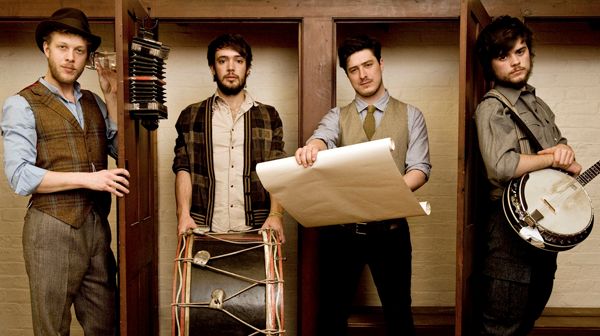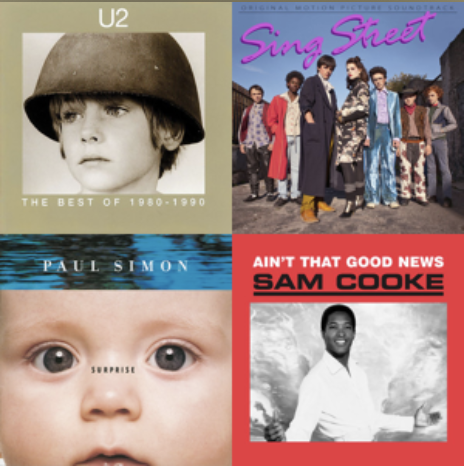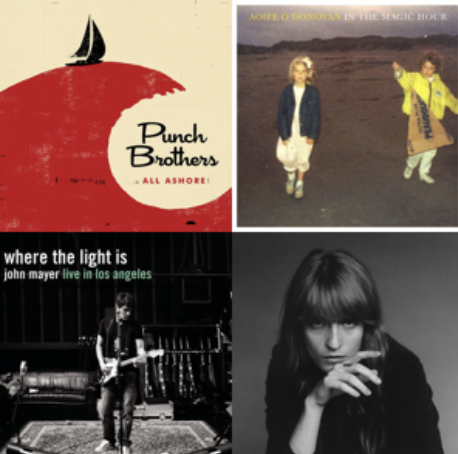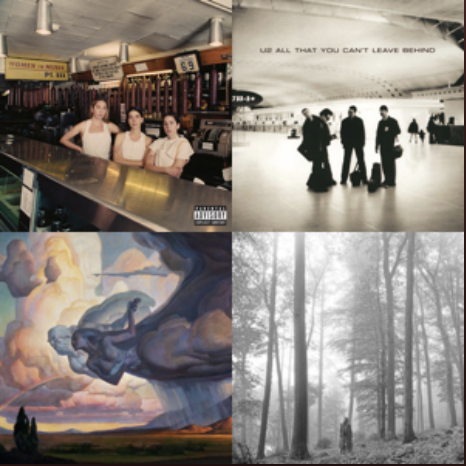“Listening to the new Mumford & Sons album. Wait nope just some goats eating a banjo.” —Sammy Rhodes, a.k.a. @prodigalsam
With their tweed jackets, braces (suspenders to us Yankees), and brogues, pickin’ banjos and strummin’ and stompin’ and hollerin’ with all their ragged might, Mumford and his sons (who in fact do not own a dry goods store) want so desperately for you to believe. They want you to earnestly believe that those moments when you’re feeling flawed, and sometimes hurt, beaten down, and need to heal are the moments when music can capture our lowest lows and our highest highs, leading us on a path to triumphant, exuberant, ecstatic, cathartic joy. All this can be yours if you just suspend your disbelief and accept that Mumford & Sons are an old-timey band from some nondescript town where they had to learn about life and love the old-fashioned way: through blood, sweat and nearly dying of dysentery. And now, with calloused hands and waxed mustaches, clad in tweed, they have come with their music to give you the soundtrack that you need to get through it, to feel it all, to be who you were meant to be, fully yourself.
Do they sell it?
Mumford & Sons are in a tough spot because there is a vast dissonance between their music and their words. This dissonance arises from the prioritization of style over substance. Their sound borrows heavily from American folk and bluegrass, the local music of rural people of modest means, but their words are the self-expressive, spiritual, existential crisis tweets of the city-raised, university-educated sort. Folk comes out of cultural tradition, oral histories, shared stories and specific regions. The songs belong to nobody and everybody, but they’re always telling a story. Marcus Mumford is not very good at telling stories, or rather he tells stories with such broadly painted obscurities of reference as to not be stories at all. Mumford & Sons’ lyrical style is ambient or atmospheric at best. Perhaps it’s just spheric, in that when Mumford is at his best, there is a general sphere of songness that the words sing and poke around in for five minutes. Oftentimes the only clue as to what an entire song is about is the title (“Babel,” “I Will Wait,” “Hopeless Wanderer”), and even then only the chorus seems to say anything about the title. At less coherent times, such as in the title track on their new album, we have advanced free association (
editorial commentary in parentheses):
‘Cuz I know that time has numbered my days (life is short)
And I’ll go along with everything you say (just along for the ride)
But I’ll ride home laughing, look at me now (the laughing ride, Chris Brown reference?)
The walls of my town, they come crumbling down (town is a metaphor, perhaps it’s a Potemkin town, Babel/Jericho reference)
And my ears hear the call of my unborn sons (reference to the future and our potentiality, also babies)
And I know their choices color all I’ve done (back to the future)
But I’ll explain it all to the watchman’s son, (who watches the watchmen?)
I never lived a year better spent in love (it must’ve been love, but it’s over now)
‘Cuz I know my weakness know my voice, so now believe in grace and choice (he is finite, and not a Calvinist)
And I know perhaps my heart is farce, but I’ll be born without a mask (farce is not an adjective, possible poetic dropping of article, vague reference to a resurrected body)
Woo! (actual lyric, also the last word uttered by Falstaff in Shakespeare’s Henry IV, part 2 [radio edit])
It’s as if Mumford writes his songs by throwing vaguely spiritual, esoteric truths and literary one-liners into a hat and drawing them out at random.
Reading the lyrics from a Mumford & Sons song is a daunting task, not because they’re challenging, but because they’re incoherent. Mumford seems afraid of writing thoughts that are longer than two or three short lines, not that this matters when your main audience is looking for a style, catchiness and a hook rather than challenging lyrics. Songs don’t have to be philosophical treatises, but a good song—like a good poem—marries truth and efficiency of language through subtlety and the suggestive power of the unspoken. Creative Writing 101: “Show, Don’t Tell.” Someone missed the memo or doesn’t have enough faith in writing or audience or some combination of the above. This is of course what makes Mumford & Sons so quotable (especially on Twitter and on Sundays). Attention deficit results in a failure to tackle the difficult questions; the songs feign to wrestle with anything approaching thoroughness or even a serious effort.
This leads us to the greatest virtue of Mumford & Sons, which is also their most obvious crutch: they know how to get a crowd going. Consider them the acoustic-folk-rock cousins of Muse, with a sound that’s built for big, loud, live performances without much room for dynamics. If Muse is about the screaming sounds of an intergalactic quest on full blast, Mumford & Sons are about spiritual crisis and desperate faith packing out a pub. They got their chops playing live, and their first album showed it, but at least maintained some sort of musical restraint. On Babel they’ve taken all the things that make for energetic concerts, cut out the parts that made for a better studio album on Sigh No More and ended up with a monotonous album that drones—in short, a 21st century Billboard chart topper. This album is regressive.
Music is emotional, but there’s a problem when its emotions lack in nuance, variety, and don’t correspond to the lyrics, as is often the case in pop music. You can take any song by Mumford & Sons and skip to about two-thirds of the way through and it will sound about the same as any of their other songs, but surely not every one of their songs is about the same thing. “Hopeless Wanderer” features a double-time punk banjo ending just because it can. Screaming, harmonizing, double kick drums, trumpets, and furious banjo picking could elicit earnest vulnerability, but it could just as easily be considered overwrought.
The sincerity that Mumford & Sons attempt to present us is, simply put, hard to believe. This is in part because of how banal the lyrics are (a pop necessity that makes for easy relatability) and in part because they take themselves so seriously. The Avett Brothers (an inevitable comparison) exude a sincerity even deeper than Mumford’s. But they have a sense of humor, a personal aspect, and an unapologetic but entirely believable awareness of their occasional absurdity. Frightened Rabbit, a band that harbors more angst than all of Mumford put together, gets to indulge in raucous screaming and chorus builds because they, like the Avetts, have tender moments of non-stylized honesty and a sense of humor. More importantly, their honesty comes with musical restraint and selective orchestration. With restraint, “Riding in your cargo van/ Driving your mom’s cargo van/ If you only knew how charming it was/ The lure of your folks’ cargo van,” which are admittedly ridiculous words, believably capture the entirety of adolescent love, its innocence and its magic.
It is the unimaginative, manufactured earnestness that ultimately makes Mumford & Sons as emotionally unfulfilling as a lot of contemporary Christian praise music. They have perfected a songwriting formula lifted straight out of the Hillsong playbook: Take any deficiencies or failings of the lyrics to elicit emotion and add accompaniment with sufficient volume, then take a few lines and repeat them again and again with feeling and honesty. Surely if the drums come in at the right time and we throw in a key change, the song will be really emotional. It’s a problem in church, and it’s a problem on the radio.
When I first heard Sigh No More, I didn’t love it, but I didn’t hate it. Listening to his music, I think that Marcus Mumford has an artistic vision in mind and an idea of what he wants to say, he just doesn’t know how to say it. He has a fine voice, and the band is talented and capable of playing tight with a lot of energy whether live or in the studio, but this second album is not the direction they should have gone. I had hoped that they would take the best parts of their first album, the lyrics that do make coherent sense and explore truth, hope, and doubt, and develop them in a deeper way with the band paired back and learning to assemble a song that stands on its own without a blaring PA to accompany. The sophomore album is a chance for musicians to develop, carefully explore their material and use the success of their first album as a means of introducing their millions of fans to better music, but Mumford & Sons have instead pandered to pithy phrases and hackneyed emotionalism. Sadly, they chose to go in the opposite direction with even more opaque and scattershot lyrics accompanied most often by loudness. It isn’t too late, there’s always hope for a third album, but given their popularity, sales numbers (Babel having just overtaken Justin Bieber’s As Long As You Love Me as highest grossing album of 2012), and audience, I suspect they won’t. Mumford & Sons are striving to grapple with serious questions of faith, existence, and relationships and their efforts to date haven’t been entirely unsuccessful, but I also think their ideas and their audience deserve better.




